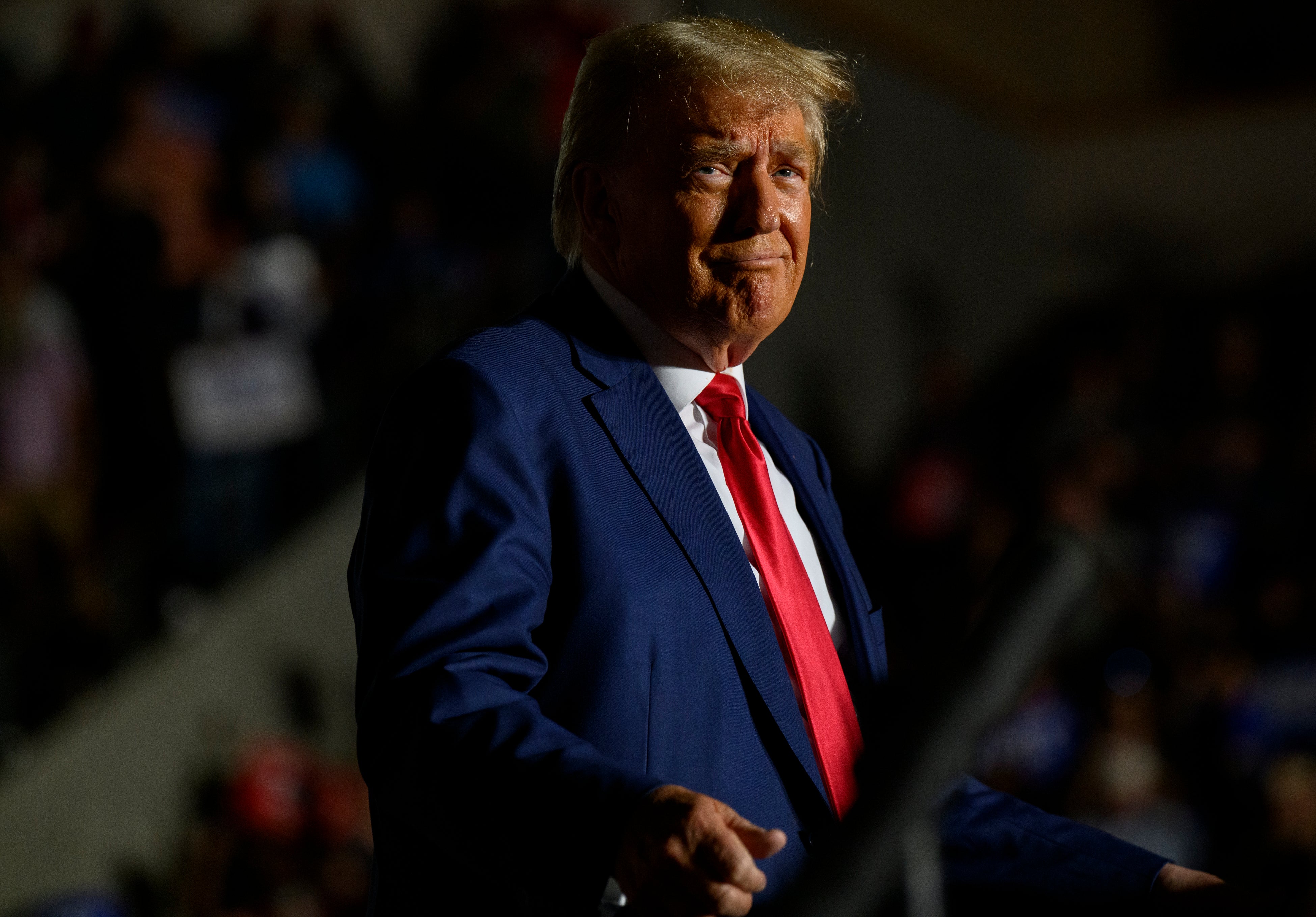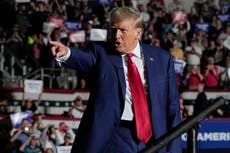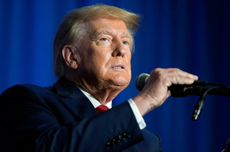Lock him up? Why Trump could still beat Biden from behind bars
The former president draws his support from a base that is deeply suspicious of the establishment, says Mary Dejevsky. Persecuting him in the courts may actually give Trump the advantage in the presidential race


As of this week, Donald Trump faces 78 criminal charges, across three separate cases. If found guilty on any of the most serious, he could go to prison. He could also campaign for, and be elected to, the presidency at the same time. In the United States, the two prospects do not exclude each other.
To most people, in most parts of the world, and especially to those of us privileged to be living in states that regard themselves as law-governed democracies, the possibility that the self-styled leader of the free world could be a convicted criminal seems fantastical. It is also hard to imagine that it would not damage his authority abroad, and by extension that of his country. Or that this would not be a consideration for the voters well before any presidential election.
But this is how the US system works and the fact that an individual such as Donald Trump could be the beneficiary says something about the United States and US democracy. Whether that something is positive or negative, might be another matter.
The overriding principle is that the people, in the shape of the electorate, should be the final arbiter. Under the US constitution there is only one offence that bars someone from presidential office and that is engaging in “insurrection or rebellion”, and the charges against Trump stop short of this. Any other conviction, and it is for the voters to decide whether it amounts to a disqualification or not.
For the most part, of course, any presidential run for a candidate with criminal convictions, or even languishing in prison, would be blighted before it had begun. He or she would be unable to raise funds for a campaign and would get nowhere near the primary contests, let alone look like the party’s frontrunner. They would call it a day.
And it is still possible that this will apply to Trump. The court cases will pile up, and Trump will decide that the game is simply not worth the candle. Indeed, this seems to be the calculation of his political adversaries: that the courts will, in effect, make a Trump presidential run unrealistic. With the presidential election more than a year away, there is plenty of time for him to change his mind.
Where this argument falls is not only that Donald Trump shows no sign whatsoever of giving in, insisting that he will continue his presidential run even if convicted, but that his followers show little sign of abandoning him either. Latest polls show that his lead over Ron DeSantis, his closest rival for the Republican nomination, has been widening. He is tied with the incumbent president, Joe Biden, in voting intentions at 43 per cent. Such poll findings are often greeted with shock and surprise, including on this side of the Atlantic – but they should not be.
The difficulty for the Democrats and for those who oppose Trump elsewhere, is that every stick and every stone that is hurled in his direction and every court case that is instituted against him, becomes proof for Trump loyalists of how right he is. If he was seen as a maverick in 2016 – and a large part of his electoral appeal resided in his outsider status – he is doubly that now (and a martyr to boot).
What is more, these past and potential Trump voters, taken on their own terms, are not completely wrong. The US political system may be renowned for its checks and balances and for the separation of powers as between the legislature, the executive and the judiciary, but it is nonetheless highly politicised in a way that makes it hard for a non-conforming outsider to prevail.
It is a tribute to the quality of US democracy that Trump was able to win the 2016 election – he spent less on his campaign than Hillary Clinton did, and withstood a barrage of questionable claims that he was in Russia’s pocket. But his opponents – who included Republicans, as well as the Democrats – and were styled by his supporters as the Washington establishment, or even the “deep state” – were highly successful in curbing his room for manoeuvre.
You can interpret this as a victory for US democracy by other means, in that a combination of the courts, Congress, the FBI and the intelligence agencies was able to scotch many of his policies, from new curbs on immigration to his hope of better relations with Russia. But another way of looking at it would be that his opponents, having failed to prevent his election, used other means to neutralise his power – the power, let it not be forgotten, of a democratically elected US president.
There are also questions that are only now being asked about the 2020 campaign – not about whether Trump really lost it, which he clearly did – but about his right to challenge the result and about how far “dirty tricks” might have contributed to his defeat.
In 2000 – the year of the “tied” election – Al Gore was criticised by fellow-Democrats for prematurely conceding defeat, in a move they argued weakened his position vis a vis George W Bush through the subsequent court proceedings. Candidates have since learned from this, and they include Donald Trump. Nor do the electoral procedures, from eligibility to vote to the reliability of the machines, enjoy much more credibility than they did then.
As for “dirty tricks”, these included the saga of a discarded laptop that is now known to have belonged to Joe Biden’s son Hunter and contained details of his dealings in Ukraine, but which was successfully passed off at the time as Russian “disinformation”. Might the truth, had it been known, have affected the outcome?
It is from a deep-seated suspicion of conventional politics that many of Trump’s supporters come – conventional politics that, in their view, ignores not just their voice, but their experience of life. And while it suits the Democrats – who are now in power – to reproduce the wilder footage of the Capitol riots from 6 January, 2021, and to appoint a special counsel to investigate and then to convene a grand jury in Democrat-dominated Washington DC to decide whether to indict the former president, this does not look fair to Trump supporters, even as Democrats would insist they were punctiliously following the law.
The point is that the vast majority of Trump supporters did not join the Capitol riot – but they continue to believe that, one way or another, their hero’s victory was “stolen” by a malevolent Washington. It is hard to see what might convince them otherwise before the election on 5 November next year.
That said, there are other imponderables. Trump’s electoral timetable will be punctuated with court appearances, from March in Manhattan (falsified tax returns to conceal illicit payments of hush money), through May in Miami (keeping classified documents at his Florida residence), to whenever a trial might be scheduled in Washington on the latest federal charges.
Nor, with advancing age and the law (the Biden laptop) becoming liabilities for both, are Trump and Biden necessarily guaranteed to be the two main nominees. If they are, however, you can bet on two things: that Trump will be up for the fight, even if it means campaigning from behind bars; and that this might not be as much of an advantage to Biden as many Democrats might hope.



Join our commenting forum
Join thought-provoking conversations, follow other Independent readers and see their replies
Comments